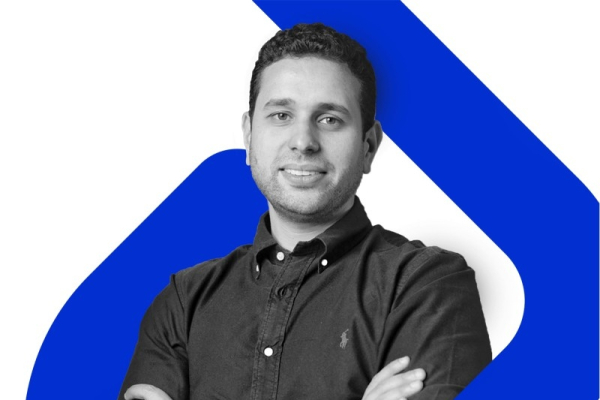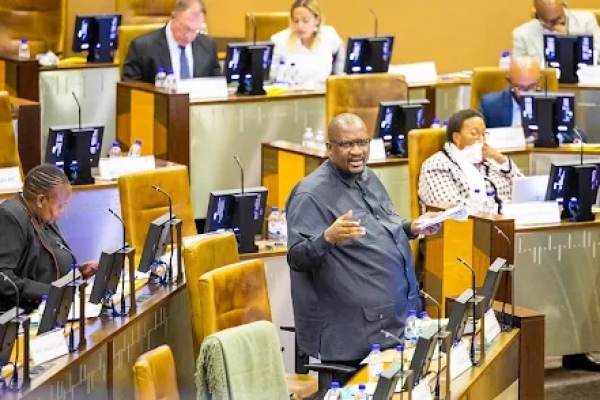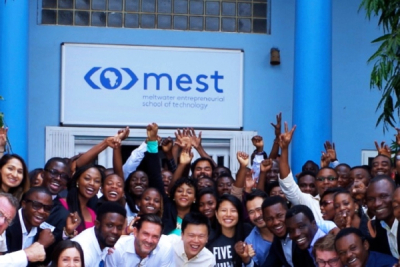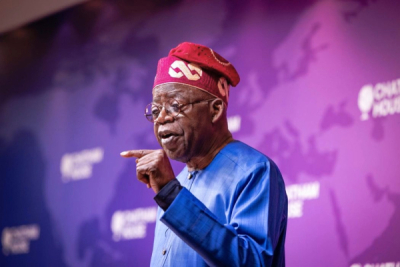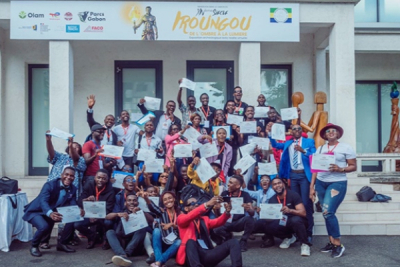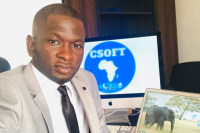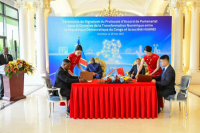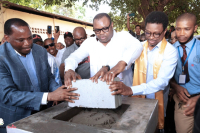He has over 12 years of experience in the pharmaceutical industry. As the co-founder and CEO of healthtech Pharmacy Marts, he transforms and modernizes the Egyptian health sector.
Ahmed Kadous (photo) is an Egyptian pharmacist who graduated from Cairo University in 2009 with a Bachelor's in Pharmaceutical Sciences. He also holds a master's in marketing from the Arab Academy of Science, Technology and Maritime Transport, which he obtained in 2011, and is the CEO of healthtech startup Pharmacy Marts.
He co-founded Pharmacy Marts, in 2021, with Haitham El-Ghotni, a senior business development and sales professional. His healthtech startup provides a digital marketplace connecting pharmacies and medical suppliers, facilitating the acquisition of medicines, medical supplies, and cosmetics.
Pharmacy Marts enables medical suppliers to list their products and offers online, allowing pharmacists to check them out, compare their prices, and source for the best deals. The startup also works with financial institutions to enable pharmacists to increase their income through BNPL (buy now, pay later) financing. Recently, it was nominated at the pre-selection event for the third edition of Egypt's Entrepreneur Awards. Ranked in the "Digital Solutions and Customer Experience Awards" category, Pharmacy Marts has been recognized as one of the country's top start-ups that transform and modernize the pharmaceutical industry.
Ahmed Kadous, one of the men who made it possible, debuted his professional career in 2009, as a Pfizer medical representative. In 2012, he joined Novartis as Executive Medical Representative. In his 9 years with the company, he successively held the positions of Marketing Manager, Market Access Manager, and Pricing Manager.
In 2021, he was appointed Patient Value Access Therapeutic Area Manager for Takeda, a pharmaceutical manufacturing company. He was also responsible for the company's market access.
Thanks to Pharmacy Marts, in 2022, Ahmed Kadous was awarded the prize for the best start-up in North Africa issued by Africa Arena. In 2023, his company was named one of the 15 most promising healthtech start-ups in Africa at the AfricaTech Awards. He also received the Outstanding Leadership Award at the Health 2.0 conference, and Pharmacy Marts received the Best Series A Start-up Award from Africa Arena.
Melchior Koba
The Gauteng provincial government is committed to the well-being and security of its population. To achieve this, the executive has turned to digital technology, which offers suitable technologies for this purpose.
On Thursday, May 25, Gauteng's Department of e-Government presented the 2023/2024 budget, as well as the digital projects planned by the province's Department of Cooperative Governance and Traditional Affairs (COGTA).
According to Mzi Khumalo (photo, center), Gauteng's executive council member for e-government, research, and development, the ZAR1.7 billion ($86 million) budget prioritizes key ICT projects like the implementation of an e-policing strategy in the province.
“Amongst other projects, the department has sought to prioritize the procurement and management of crime-fighting technologies to establish e-policing for the Gauteng Province,” said Mr. Mzi Khumalo.
The sum allocated has enabled Gauteng province to acquire facial recognition CCTV cameras in Diepsloot, one of the areas identified as crime hotspots. The aim, according to Gauteng Premier Panyaza Lesufi, is to enable police to monitor the area 24 hours a day, and to highlight the ability of CCTV cameras to produce data that can be used in the fight against crime.
Other projects will also be implemented, including the acquisition of tracking devices to monitor vehicles, firearms, and other assets used in crime-fighting, and the manufacture of electronic panic buttons enabling the population to quickly contact the emergency services when in distress.
The Gauteng administration is also planning to develop a payment engine for cashless transactions for all provincial government departments and entities. There are also plans to continue providing services over the Gauteng broadband network (by providing Wi-Fi connectivity to schools, libraries, hospitals, community centers, and homes), to bring new services online, and to strengthen the youth’s ICT skills.
Samira Njoya
More than an academy or an incubator, MEST Africa is a large community catalyzing tech entrepreneurship in Africa. It is committed to innovation to build a promising tech ecosystem on the continent.
In the rapidly growing African tech landscape, MEST Africa is undoubtedly one of the notable incubators and communities advancing things. Founded in 2008 by Jorn Lyseggen, founder of the Meltwater Foundation, it trains and supports the most promising technology entrepreneurs, opening up new avenues for innovation and economic growth.
It is based in Accra, with centers in Lagos, Cape Town, and Nairobi. It is all by itself an Africa-wide technology entrepreneur training program, an in-house seed fund, and a network of incubation centers for African tech startups. It provides African technology entrepreneurs with technology training, financing, and support in software development and business and communications.
MEST Africa's year-long training program is designed to create an immersive, hands-on learning experience. Students are exposed to a balanced combination of theoretical courses, practical projects, and company internships. Its members have access to a global network of experts knowledgeable in subjects like sales, engineering, marketing, and more.
As an incubator, it supports graduates who have successfully convinced its Board of Directors of the prospects of their startups. These graduates receive seed funding and are allowed to access a collaborative workspace and experienced mentors to guide them through their entrepreneurial journey.
The tech entrepreneurship support agency also regularly organizes, in collaboration with its partners (GIZ, Amazon Web Services, Microsoft, Samsung, Mastercard, and Impact Lab, among others), events, conferences, and workshops to foster collaboration, knowledge sharing, and networking opportunities between entrepreneurs, investors, and industry professionals. One of its initiatives is Edtech Monday, a weekly show broadcasted live on Facebook and on CITI FM (Ghana) every Monday.
MEST Africa's impact has an undeniable impact on the African tech ecosystem. Since its creation, it has trained over 1,000 tech entrepreneurs and financed more than 80 companies, helping create over 750 jobs on the continent. It boasts support to startups in sectors like e-commerce, agritech, fintech, healthcare technology, edtech, AI, and more.
The next cohort of its training program, consisting of 60 students as usual, will start in August 2023.
Melchior Koba
During his presidency, which began in May 2015, outgoing president, Muhammadu Buhari, successfully showcased Nigeria on the international tech scene. His successor wants to do even better over the next four years.
Bola Tinubu (photo), Nigeria’s new President sworn in on Monday, wants to leverage digital technologies to further develop the country.
To this end, he has drawn up a program focusing on seven areas: innovation and entrepreneurship, service provision and outsourcing, technology manufacturing, e-commerce, digitization of public services, broadband, and blockchain.
His team plans to implement policies to support local financing opportunities and access to capital to encourage foreign investors to continue investing in Nigeria. Policies to train and empower young people in ICT will also be developed.
They also plan to develop the e-commerce sector by upgrading the national transport infrastructure to provide nationwide services and meet the needs of consumers across the country.
The new government also wants to invest in the manufacture of technological products since it presents another major opportunity for job creation. Imported smartphones will be gradually replaced by local products from local assembly plants built to develop the tech manufacturing sector.
Concerning blockchain, the new President plans to reform government policy to encourage the prudent use of this new technology in finance and banking, identity management, revenue collection, and the use of crypto-assets.
Aware that all these projects will not come to fruition without good Internet connectivity, the new president is set on boosting broadband connectivity and providing high-speed internet to 90% of the population within the next two years. Currently, Nigeria's national fiber optic network is 98% complete, according to the government.
Universal Internet coverage will enable the use of public services, with further digitization expected for the coming months, we learn.
Mr. Tinubu targets one million jobs created in the ICT sector in his first 24 months in office.
Moroccan home services marketplace PrestaFreedom recently secured MAD11 million ($1.1 million) in financing from the Azur Innovation Fund.
The funds will enable the company not only to improve its logistics and technological infrastructure but also develop its activities and pursue ambitious expansion strategies in several African markets, beginning next year.
Gabon's capital, Libreville, will host the third edition of the audiovisual and digital career fair SAMEAU next June 6-8. The event whose theme is "Ethics and deontology of digital media during election periods in Gabon," will feature a number of journalism, TV and radio animation, digital communication, computer graphics, and photography workshops.
As the CEO of a company specializing in application development, artificial intelligence, and connected devices, he creates practical technological solutions for people. His latest innovation is a tracking bracelet that enables Muslim pilgrims to always find their way around Mecca.
On May 25, 2023, Guinean tech company Continental SOFT unveiled a new GPS tracking bracelet specifically designed for Muslim pilgrims. The product, called Smart Hajj 2.0, uses cutting-edge technologies such as GPS, QR codes, mobile connectivity, and advanced tracking algorithms to prevent users from getting lost while performing the annual Islamic pilgrimage (Hajj). It is made from nylon and plastic, making it resistant to bad weather.
"Each pilgrim is equipped with a discreet, lightweight, and easy-to-wear tracking device, which continuously transmits his or her geographical position. A mobile application also tracks the pilgrim’s moves. If lost, the latter can simply flash the QR code to instantly check the guide” and get the route to take, explained Mohamed Souaré, the brain behind the innovative product and founder/CEO of Continental SOFT.
Apart from Smart Hajj 2.0, the Guinean innovator has developed several tech products. They include Smart désinfectant - Covid-19, a disinfection tunnel designed to combat the spread of the coronavirus pandemic. He is also behind Calculatrice N'ko, a calculator using the N’Ko alphabetic script, and Smart School, an intelligent machine capable of detecting students’ location and informing parents in real-time. In 2020, thanks to Continental SOFT, he was awarded the Katala Award issued by Covid Hero.
Melchior Koba
In 2019, DRC published its digital transformation program, focusing mainly on the development of the digital economy to improve its contribution to GDP. To successfully implement that goal, it is counting on partnerships with countries like China whose digital economy contributed 41.5% to GDP in 2022.
China and the Democratic Republic of Congo (DRC) recently signed a memorandum of understanding to strengthen digital cooperation. The memorandum was signed in Beijing, last Friday, by Congolese Digital Minister Désiré Cashmir Eberande Kolongele and Chinese Minister of Foreign Affairs, Qin Gang, on the sidelines of President Félix Tshisekedi's visit to China.
"We both expressed our desire to enhance cooperation through win-win partnerships that will be mutually beneficial for our people. Our relationship has greatly evolved. In the DRC, many things symbolize the friendship between our two countries,” said President Félix Tshisekedi.
On Sunday, May 28, at the end of the Congolese president's visit, a new agreement was signed in Shenzhen between the Congolese government and tech giant Huawei. It aims to promote digital transformation in the DRC, particularly the digitization of government services. According to President Tshisekedi, it will enable the development of several areas, including energy, education, health, public finance, and security.
The partnerships signed during the visit are fully in line with the 2025 Digital Transformation Plan, published by the government in 2019. That plan aims to leverage digital technologies to improve integration, good governance, economic growth, and social progress.
Let’s note that President Félix Tshisekedi's visit to China is part of the celebrations marking the 50th anniversary of the normalization of diplomatic relations between China and the DRC.
Samira Njoya
The innovative project, a first of its kind in Africa, is launched to train the youth to prepare for the digital future and develop the digital economy.
On Saturday, May 27, Guinean Prime Minister Bernard Goumou (photo, center) officially launched the construction of a digital village in Ratoma, Conakry.
According to the government official, the digital village aims to make Guinea a major player in Africa’s digital revolution and an internationally competitive country.
The infrastructure will span over 46,707.12 square meters. It is co-funded, to the tune of $14.6 million, by the telecom regulator ARPT, the National Agency for Universal Service of Telecommunications and Digital (ANSUTEN), and the National Development Budget (BND).
It will host four academic and one administrative block, two buildings to house students, an amphitheater, a library, a teachers' residence, a sports center, secondary buildings, external landscaping and roads, and miscellaneous networks (VRD). It is expected to be completed within 12 months.
According to the initiator of the project, Vocational Minister Alpha Bacar Barry, the digital village will offer ongoing ICT training from primary school through to the university level. In addition to the digital education center, the village will also have a digital entrepreneurship center and a research and development center.
This ambitious project, the first of its kind in Africa, will stimulate the development of the digital sector and train a generation of Guinean talent capable of meeting the challenges of technological innovation. It will also draw the country closer to meeting its goal of creating a generation of digital champions to be able to fully capitalize on the global digital economy for growth by 2030.
Samira Njoya
Common law is practiced in some 80 countries around the world. Lawyers can therefore refer to court decisions in these countries to defend their clients more effectively. However, accessing such information can sometimes be tedious. Hence the importance of Judy Legal.
Judy Legal is a digital solution developed by a Nigerian start-up. It gives lawyers easier access to case law from common law countries (around 80 countries), particularly Nigeria, Kenya, and Ghana, to help them defend their cases in court.
It aims to be the “most comprehensive, most utilized database of case judgments in the world.”
“Our mission is to support the legal profession and the administration of justice by providing a law reporting service in a convenient form and at a moderate price,” it says.
With its Android and iOS apps, users can access its services once they set up accounts and buy a premium subscription. The type of services they are given depends on their subscription type. The startup has three premium subscriptions. The basic subscription costs $25 monthly and allows services like choosing a database, refining cases by date, court, country, and subject matter, and also highlighting comments. There are also the standard ($50 monthly) and premium ($150 monthly) plans besides the basic plan.
Since its launch, the Android version of its mobile app has been downloaded more than 10,000 times. In 2018, Judy Legal was one of the winners of the Meltwater Entrepreneurial School of Technology (MEST) program, going home with a $100,000 check. Two years later, it was selected to take part in the fifth cohort of Google for Startups Accelerator Africa.
Adoni Conrad Quenum
More...
The incubator encourages and supports businesses that solve socioeconomic problems in their communities. It particularly focuses on women-led or owned businesses.
Wennovation Hub is a start-up incubator and accelerator working to create high-impact businesses. It was established in 2010, in Nigeria, and officially opened in 2011 to help achieve sustainable development in Africa by encouraging youth innovation.
Born of a partnership between venture capital firm LoftInc Capital Management and the non-profit organization Africa Leadership Forum, its role is to train innovators through tailor-made programs that turn ideas into successful businesses. It focuses on high-impact sectors such as education, agriculture, healthcare, clean energy, and infrastructure, among others, and emphasizes job creation in its programs.
It also offers modern coworking spaces at its three Nigerian campuses based in Ibadan, Lagos, and Abuja. The spaces are equipped with the essential technical tools that bright minds need to come up with business ideas. It also offers office space to entrepreneurs and founders, small and medium-sized enterprises, middle managers, freelancers, and creative artists.
In November 2022, the incubator announced its expansion outside Africa, starting with Barbados. In partnership with youth empowerment organization The Next Economy, it recently launched an incubation program targetting early-stage companies founded or co-founded by women.
To date, Wennovation Hub has supported over 450 start-up teams and more than 150 women-led businesses, creating more than 12,500 jobs in the process. They include Asusu, which promotes the digitization and financial inclusion of cooperatives, and Afrimash, which is an online destination for farmers looking for poultry, fish, and livestock.
Its partners include AfriLabs, LoftInc Group, the Bill and Melinda Gates Foundation, Lagos Angel Network, Emory University, Total Energy, and the University of Ibadan.
Melchior Koba
South Africa, like most African countries, faces growing demand for high-speed connectivity amidst accelerated digital transformation. Data service providers need more capacity to meet this demand.
The Independent Communications Authority of South Africa (ICASA) announced, Tuesday (May 23) it has released the lower 6GHz frequency band (5925-6425 MHz) to allow the provision of high-speed Wi-Fi connectivity.
According to the regulator, the additional spectrum can support more simultaneous connections, offer reduced latency, and provide faster data speeds, resulting in less interference, especially in potentially congested high-density areas and campuses.
The operation was completed through an amendment of Schedule B of ICASA's 2015 radio spectrum regulations. The Regulatory Authority began the process last December, following pressure from Internet service providers in the Rainbow Nation months before.
According to the Wireless Access Providers Association of South Africa (WAPA), the opening of the 6 GHz frequency band is expected to enable the deployment of Wi-Fi 6E, the latest Wi-Fi technology, bringing in as much as $57.76 billion to the country over the next 10 years.
“Overall, the implementation of the lower 6 GHz frequency band is expected to provide significant improvements, more robust and reliable wireless communications, and an enhanced user experience for both the consumers and businesses throughout the country,” the ICASA writes.
Isaac K. Kassouwi
Aware of the challenges faced by small-scale farmers, he co-founded Pula to provide insurance products to people who need them but have never bought any.
Thomas Njeru (photo) is a Kenyan entrepreneur and co-founder of insuretech Pula. He graduated from the University of Nairobi, in 2009, with a bachelor's of Actuarial science. In 2015, he got a chartered financial analyst degree from the Institute of Chartered Financial Analysts of India University. In 2018, he graduated from Strathmore Business School with a Master of Commerce.
His insuretech, Pula, operates in Africa, Asia, and Latin America. It handles insurance product design, risk placement, farmer and herder training, and claims assessment. It offers three main products, namely Yield Index Insurance (YII), Hybrid Index Insurance, and Indexed Livestock Insurance (IBLI).
Its yield index insurance covers all yield-related risks. Among other things, it insures the value of purchased inputs in the event of low yield. Its hybrid index insurance is a combination of weather index insurance (WII) and yield index insurance (YII), offering farmers comprehensive coverage by maximizing the benefits of both insurance products.
The third product, indexed livestock insurance, is an asset insurance program that covers farmers when pasture is inadequate, often due to drought or delayed rainfall. Since 2015, Pula's products have impacted more than 6.7 million smallholder farmers. Thomas Njeru, the man who made that possible, entered the insurance world, in 2009, as an actuary at UAP-Old Mutual Insurance Group. In 2011, he joined Aon Hewitt as a consulting actuary. Then, in 2012, Deloitte South Africa hired him for the same position. About two years later, he was promoted to the position of director of actuary and coinsurance advisory. In 2019, the New York Times named him one of the global agriculture visionaries.
Melchior Koba
The Innovation Village aims to create a new generation of entrepreneurs who solve industry and community challenges. In addition to the collaborative framework it provides for its members, it organizes events and programs to facilitate their development.
The Innovation Village is a springboard for entrepreneurs and innovators that strive to solve Africa’s most processing problems. Founded by C.K. Japheth, in 2015, it is a coworking space that offers business incubation and acceleration services to start-ups.
It aims to foster the emergence of a wave of businesses that not only have a measurable impact on the world but also significantly improve the lives of everyone on the planet. The incubator targets startups in the agritech, insurtech, energy, edtech, fintech, tourism, healthcare, supply chain, manufacturing, and media segments.
It implements several programs and initiatives, including the Uganda Innovation Week 2022, which brought together 1,000 participants, over 80 speakers, and more than 50 exhibitors. It also organizes the DataHack4Fi, an annual innovation competition that promotes evidence-based decision-making to improve the delivery of financial services to low-income people.
The incubator also organizes events to enable successful entrepreneurs to share their experiences. One such event is VILLAGE SOIREE, set to take place today, May 26.
To date, it has supported 2,000 entrepreneurs, including 40% women, in six segments. It also boasts a community of 140 start-ups, over $3 million raised, and 100 events hosted.
The startups it supported include Safepay, a digital payment solution for public transport users, UGIT Engineering and Consulting, a company offering consulting, engineering, and design services, and Infinity IcT Solutions, which aims to become a data center by providing quality information technology services.
Its partners for various activities include The Mastercard Foundation, Liquid Telecom, MTN, and UNCDF.
Melchior Koba


